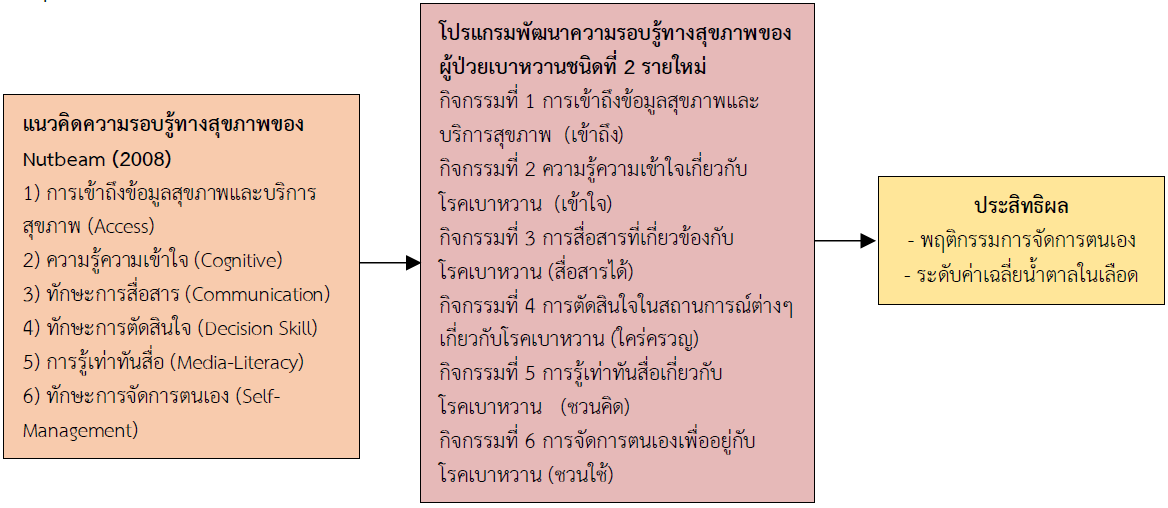การพัฒนาโปรแกรมพัฒนาความรอบรู้ทางสุขภาพในผู้ป่วยเบาหวานชนิดที่ 2 รายใหม่
คำสำคัญ:
ความรอบรู้ทางสุขภาพ , ผู้ป่วยเบาหวานชนิดที่ 2 รายใหม่, วิจัยและพัฒนาบทคัดย่อ
การวิจัยและพัฒนานี้ มีวัตถุประสงค์เพื่อศึกษาสถานการณ์ความรอบรู้ทางสุขภาพ พัฒนา และศึกษาประสิทธิผลโปรแกรมพัฒนาความรอบรู้ทางสุขภาพของผู้ป่วยเบาหวานชนิดที่ 2 รายใหม่มี 3 ระยะ คือ ระยะที่ 1 ศึกษาสถานการณ์ความรอบรู้ทางสุขภาพของผู้ป่วยเบาหวาน โดยใช้แบบสอบถามความรอบรู้ทางสุขภาพผู้ป่วยเบาหวาน 240 คน การสัมภาษณ์เชิงลึก ใช้แนวทางสัมภาษณ์เกี่ยวกับประสบการณ์และมุมมองด้านความรอบรู้ทางสุขภาพ จากผู้ป่วยเบาหวานและพยาบาล กลุ่มละ 20 ราย ระยะที่ 2 พัฒนาโปรแกรมพัฒนาความรอบรู้ทางสุขภาพ ผ่านการตรวจสอบโดยผู้ทรงคุณวุฒิ 3 คน นำโปรแกรมใช้กับผู้ป่วยเบาหวาน จำนวน 10 คน ปรับปรุงโปรแกรม ระยะที่ 3 ทดสอบประสิทธิผลของโปรแกรมพัฒนาความรอบรู้ทางสุขภาพ จากผู้ป่วยเบาหวาน 70 คน แบ่งออกเป็นกลุ่มทดลองและกลุ่มควบคุมกลุ่มละ 35 ราย โดยใช้แบบประเมินพฤติกรรมการจัดการตนเองและค่าเฉลี่ยน้ำตาลสะสมในเลือด วิเคราะห์ข้อมูลโดยการวิเคราะห์เชิงเนื้อหา และสถิติเชิงพรรณนา สถิติ Independent t-test และ Paired t-test ผลการวิจัยพบว่า
1. การศึกษาสถานการณ์ มีคะแนนเฉลี่ยความรอบรู้ทางสุขภาพ อยู่ในระดับปานกลาง ด้านการบริการของบุคลากรสาธารณสุข พบว่าการส่งเสริมการสืบค้นความรู้และวิเคราะห์การเลือกใช้สื่อที่น่าเชื่อถือดำเนินการได้เพียงบางส่วน และการส่งเสริมการมีปฏิสัมพันธ์และการจัดการตนเองในด้านสถานการณ์ต่าง ๆ ยังมีน้อย
2. โปรแกรมพัฒนาความรอบรู้ทางสุขภาพ ประกอบด้วย 6 กิจกรรม คือการเข้าถึงข้อมูลสุขภาพและบริการสุขภาพ ความรู้ความเข้าใจเกี่ยวกับโรคเบาหวาน การสื่อสารที่เกี่ยวข้องกับโรคเบาหวาน การตัดสินใจในสถานการณ์ต่างๆเกี่ยวกับโรคเบาหวาน การรู้เท่าทันสื่อเกี่ยวกับโรคเบาหวาน การจัดการตนเองเพื่ออยู่กับโรคเบาหวาน ระยะเวลาดำเนินกิจกรรม 12 สัปดาห์
3. ผลการทดสอบประสิทธิผลของโปรแกรม พบว่า ค่าเฉลี่ยคะแนนพฤติกรรมการจัดการตนเองกลุ่มทดลองหลังการทดลองสูงกว่ากลุ่มควบคุมอย่างมีนัยสำคัญทางสถิติ และค่าเฉลี่ยน้ำตาลสะสมในเลือดกลุ่มทดลองหลังการทดลองต่ำกว่ากลุ่มควบคุมอย่างมีนัยสำคัญทางสถิติที่ระดับ .05 และ .01
ควรนำโปรแกรมการพัฒนาความรอบรู้ทางสุขภาพสำหรับผู้ป่วยโรคเบาหวานไปใช้เพื่อส่งเสริมพฤติกรรมการจัดการตนเองและผลลัพธ์ทางคลินิก
เอกสารอ้างอิง
American Diabetes Association. (2019). Standards of medical care in diabetes 2019. Diabetes Care, 42, (Suppl.1), S13-S28.
Cheumthonh, P., Kimsungnoen N., & Namjuntra, R. (2020). The effects of educative supportive program on self care behaviors and HbA1c in persons newly diagnosed with type 2 diabetes. Journal of Nursing and Health, 43(1), 78-86. (in Thai)
Chiangkhong, A., Duangchan, P., & Intarakamhang, U. (2017). Health Literacy in Diabetic Adult: Experience of Diabetic Patient and Perspective on Health Literacy. Kuakarun Journal of Nursing, 24(2), 162-178. (in Thai)
Choeisuwan, V. (2017). Health literacy: Concept and Application for Nursing Practice. Royal Thai Navy Medication Journal, 44(3), 183-197. (in Thai)
Harada, M., Fujihara, K., Osawa, T., Yamamoto, M., Kaneko, M., Matsubayashi, Y., et al. (2018). Effects of treatment-achieved HbA1C on incidence of micro-/macrovascular complications in patients with diabetes mellitus. Diabetes, 67(Supplement_1), 444-P
Intaboot, K., Kalampakorn, S., & Pichayapinyo, P. (2017). The Effect of a Self-Management and Social Support Program for on New Cases with Type 2 Diabetes. Journal of Public Health Nursing, 31(2), 11-27. (in Thai)
Klarob, R., Sikaow, O., & Prasertsong, C. (2021). The effect of health literacy program for uncontrolled type 2 diabetes mellitus patients. Journal of The Royal Thai Army Nurses, 23(3), 274-282. (in Thai)
Kochragsa, N. & Panchakhan, N. (2021). Analysis of Caring System for New Diabetes Patients in Lampang Province. Journal of Health Sciences Scholarship, 8(1), 69-81. (in Thai)
Krejcie, R., & Morgan, D. (1970). Determining sample sizes for research activities. Education and Psychological Measurement, 30(1), 607-610.
Naktes, C., Thiangtham, W., & Pichayapinyo, P. (2022). The effects of application of motivation throry and family support in blood sugar control behavior among the new diagnosed DM type 2. Journal of Health and Health Management, 8(1), 89-103. (in Thai)
Nonmetawat, C., Kantawong, K., & Oupra, R. (2024). The Influence of Health literacy, Self-care Agency, and Family Support on Hemoglobin A1C Level in Patients with Type 2 Diabetes Mellitus. The Southern College Network Journal of Nursing and Public Health, 11(2), e266575. (in Thai)
Nutbeam, D. (2008). The evolving concept of health literacy. Social Science and Medicine, 67(12), 2072-2078.
Pannark, P., Moolsart, S., & Kaewprom, C. (2017). The effectiveness of a program for health literacy development of the patients with uncontrolled type 2 diabetes at Bangwua district, Chachoengsao province. Nursing Journal of the Ministry of Public Health, 27(3), 91-106. (in Thai)
Phitsanulok Provincial Health Office. (2022). Annual Report 2022. Phitsanulok: Provincial Health Office.
Samrannet, W., Korissaranuphab, N., & Srisarakham, O. (2022). The Association between Health Literacy and Self-Care Behavior in Patients with Type 2 Diabetes Mellitus Living in the Mueang District of Mahasarakham Province, Thailand. Thai Red Cross Nursing Journal, 15(3), 198-213. (in Thai)
Sarakshetrin, A., Tongpeth, J., & Sriwongsa, A. (2022). The effectiveness of health literacy enhancing and developing program on A1C blood pressure level health literacy and diabetes and hypertension control behaviors. Journal of The Royal Thai Army Nurses, 23(1), 333-343. (in Thai)
Sriklo, M., Tamdee, D., Aungwattana, S., & Kaewthummanukul, T. (2023). Effects of Enhance Health Literacy through Transformative Learning Program on Self-Management and Hemoglobin A1C Level Among Adults with Uncontrolled Type 2 Diabetes: A Randomized Controlled Trial. Pacific Rim International Journal of Nursing Research, 27(2), 317-333.
Thailand Development Research Institute: Case Study report. (2018). Estimated public health expendtures over the 15 next year. Retrieved 26 August 2022 from http://www.google. Com/search?q
Thungmuang, J., & Muktaphan, B. (2018). Relationship between health intelligence and self-care of type 2 Diabetes. Journal of Health Education, 41(1), 103-113. (in Thai)
Wannataworn, A., Kleechaya, P., & Kai-nuna, P. (2023). Health literacy of type 2 pre-diabetics and diabetics in Thailand. Journal of Social Sciences and Humanities Research in Asia, 29(1), 55-73. (in Thai)

ดาวน์โหลด
เผยแพร่แล้ว
ฉบับ
ประเภทบทความ
สัญญาอนุญาต
ลิขสิทธิ์ (c) 2024 วารสารเครือข่ายวิทยาลัยพยาบาลและการสาธารณสุขภาคใต้

อนุญาตภายใต้เงื่อนไข Creative Commons Attribution-NonCommercial-NoDerivatives 4.0 International License.
1. บทความหรือข้อคิดเห็นใด ๆ ที่ปรากฏในวารสารเครือข่าย วิทยาลัยพยาบาลและการสาธารณสุขภาคใต้ ที่เป็นวรรณกรรมของผู้เขียน บรรณาธิการหรือเครือข่ายวิทยาลัยพยาบาลและวิทยาลัยการสาธารณสุขภาคใต้ ไม่จำเป็นต้องเห็นด้วย
2. บทความที่ได้รับการตีพิมพ์ถือเป็นลิขสิทธิ์ของ วารสารเครือข่ายวิทยาลัยพยาบาลและการสาธารณสุขภาคใต้







